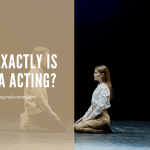Every performer you’ve ever heard of had to start somewhere, even though it can be difficult to imagine sometimes. They all took their first steps onto a stage, went through their first rehearsal, and said their first lines. Your favourite actor once had a fresh-faced beginner appearance and was as bewildered and in awe of the weird new world of acting as everybody else. Like everyone else who is learning something new, they made mistakes as well. The difference was that, in addition to having inherent skills, they also had the motivation and drive to put in the effort necessary to learn from their mistakes and improve. Here are some frequent mistakes and their solutions.

Ignoring Volume and Diction: If you have a body mic and are performing for television or film, you don’t need to be concerned about volume. But you still need to speak properly and with good enunciation. Additionally, it is imperative to make sure that the audience members in the back row can easily hear you when you are on stage, particularly during the “silent” periods. The solution: to solve this issue, determine the volume necessary to be heard in the back of a packed theatre with the aid of a friend, crew member, or camera, and then get proficient at hitting that volume each time. Additionally, each actor should undertake physical warm-ups prior to each performance in addition to their regular warm-ups, which should include tongue twisters and diction drills. Cold performance has the same risk of being unsightly as it would for an athlete. Even if you don’t hamstring yourself, your director and fellow actors will be aware that not everyone is present. Even untrained viewers will pick up on the oddity. Don’t shortchange your warm-ups in order to deceive your castmates, your audience, your show, or yourself.
Many younger actors run the risk: Of having their entire performance-and maybe the entire show-derailed by anything even the tiniest bit off-kilter. Whatever goes wrong, you just can’t abandon your morals. You really must remain present, no matter what, unless someone suffers a heart attack or the building is set on fire. You cannot say stop until the movie is over or the director signals to cut. Without running the risk of being smothered by makeup sponges and shunned, one might say, “I don’t know where we are. The solution: learn your lines upside-down, inside-out, and backwards and forwards. You must be able to keep up with other actors who leap through pages and even fill in any information that may have been missed by them. Practice maintaining character and conversing with your fellow actors while they are acting out their parts. You might be amazed by the insights you might uncover in such circumstances.
Managing Stage Fear: Some performers out there claim they never experience stage fright or nervousness, with the inference being that if you do, you could be in some way lacking. That is complete crap, not to belabour the subject. Some legendary actors who have achieved some big awards like Oscar, Grammy, and Golden Globe award winners are believed to have had such severe stage fright during their whole careers that they would frequently vomit just off stage a few seconds before their first entrance. Experienced performers have stage fright, but they learn the techniques to deal with it. The solution: knowledge. The more practise you get, the more at ease you’ll feel on opening night. Practice in front of peers, family, and friends. Start a scene study group, enrol in an improv class or group, participate in open mic evenings, and audition as frequently as you can. Perfectionism is a process that requires practise. This also holds true for learning your lines; you’ll feel more at ease if you understand your role well. Breathing exercises are another remedy. Just before a performance, close your eyes, focus on your breathing, and breathe all the way to the bottom of your lungs. Just keep in mind that even when you’re performing, you are still a human being among other humans doing something extraordinary: you’re sharing a small portion of your heart in an effort to connect with our shared humanity and existence throughout the history of our species as it is revealed through performance. Achieve this with joy and love.
After overcoming stage fear: Many people let the pendulum swing too far in the other direction and forget that there are people watching and listening to them as they perform. The solution is simple: if speaking to another actor directly or turning fully upstage requires turning your body away from the audience or camera, avoid doing so. However, you may benefit yourself and your show by making sure you cheat your body and facing out to the audience to make sure you are seen and heard. Good directors will guide their performers in making the appropriate blocking decisions. Consider the audience as an additional performer who needs to be informed about what is happening in the scene. In order to achieve that


